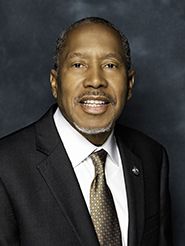Senator Darryl Rouson - Contact Information
Official contact information for Senator Darryl Rouson of Florida, including email address, phone number, office address, and official website.
| Name | Darryl Rouson |
| Position | Senator |
| State | Florida |
| Party | Democratic |
| Email Form | |
| Website | Official Website |
Editorial and Source Notes
Last reviewed: January 8, 2024
We prioritize official government pages and published records. Information can change after publication.
Report a correction: see our Editorial Policy.
About Senator Darryl Rouson - Democratic Representative of Florida
Darryl Ervin Rouson was born on July 20, 1955, in New Orleans, Louisiana. He is a Democratic member of the Florida Senate who has represented the 16th district, which includes parts of Pinellas and Hillsborough Counties from downtown St. Petersburg to downtown Tampa, since 2016. He previously served four terms in the Florida House of Representatives from 2008 to 2016.
Rouson’s father was a guidance counselor at Gibbs Junior College and an administrator at St. Petersburg Junior College. His mother taught French and English at Sixteenth Street Junior High and Lakewood Senior High. She was a pioneer of integration in Pinellas County. Rouson moved to St. Petersburg at age three and lived in Cromwell Heights. He attended a Bishop Barry High School which later became St. Petersburg Catholic High School. He returned to New Orleans to attend college at Xavier University and graduated in 1977. He received his law degree from the University of Florida Spessard Holland Law Center in 1979.
In 1980, he returned to St. Petersburg with a job at Gulfcoast Legal Services. Shortly afterward, he opened his own practice. He developed an addiction to cocaine that grew at the expense of his practice, his standing in the community, and his marriage. In 1987, he sold his practice and his home on Pinellas Point. He divorced his wife and left St. Petersburg. After some time, he met Reverend George Clements in Chicago. Reverend Clements was the founder of One Church-One Child, an adoption program. Rouson became the recovery revival coordinator for One Church-One Addict, a program that taught churches how to help recovering addicts.
Rouson served as the president of the St. Petersburg NAACP. In March 2017, Rouson was appointed to the Florida Constitution Revision Commission, a 37-member commission that reviews and proposes changes to the Florida Constitution. The commission convenes every 20 years. Members of the commission travel to different parts of Florida to perform research and receive public testimony before recommending these ballot measures.
Frequently Asked Questions about Senator Darryl Rouson
How can I contact Senator Darryl Rouson?
You can contact Senator Darryl Rouson via phone at their office number, by visiting their official website , or by sending mail to their official office address.
What party does Darryl Rouson belong to?
Darryl Rouson is a member of the Democratic party and serves as Senator for Florida.
